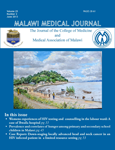
|
Malawi Medical Journal
College of Medicine, University of Malawi and Medical Association of Malawi
ISSN: 1995-7262
Vol. 30, No. 2, 2018, pp. 99-102
|
 Bioline Code: mm18021
Bioline Code: mm18021
Full paper language: English
Document type: Research Article
Document available free of charge
|
|
|
Malawi Medical Journal, Vol. 30, No. 2, 2018, pp. 99-102
| en |
Community health priorities: Lessons for malaria prevention from Balaka district, Malawi
Parker, Warren; Pennas, Thaddeus & Kommwa, Innocent
Abstract
Introduction
Communication to address priority health challenges typically draws on epidemiological research in conjunction with referencing
global and country strategies. While community-level perspectives on health challenges typically align with national priorities, nuances
and barriers that constrain health response may be less well known. To deepen understanding of the relation between situational
aspects of health and ways of making meaning, community insights into health priorities were explored.
Methods
Action Media, an established participatory research methodology for informing health communication design and strategy, was
undertaken with parents of children under 5 in Balaka District, Malawi.
Results
Participants identified malaria as a priority concern in their community. While it was reported that there was strong commitment to
consistent use of long lasting insecticide treated nets, there was frustration that malaria incidence remained high. It was observed that
risk of exposure to mosquito bites was increased as a result of chores and other activities that extended into the early evenings prior
to retiring to bed under a bed net. Bed bug infestations were said to be a common and ongoing concern. Some community members
alleviated discomfort by abandoning their beds and sleeping outside without adequate protection while others boiled their bed nets to
remove bed bugs. Accessing distant health facilities when ill with malaria was difficult for adults and children. Participants identified
the need for effective strategies to address these concerns including accessing mosquito repellant, eradicating bed bugs, treating
malaria locally and collaborating in malaria control activities.
Conclusions
Meeting targets for malaria prevention requires consideration of contextual factors that undermine effective malaria prevention
in affected communities. Such factors are not immediately apparent through epidemiological data. Regularly assessing contextual
challenges in high malaria incidence areas provides opportunities to understand gaps, to refine intervention strategies and to inform
communication programming.
|
| |
© Copyright 2018 - The College of Medicine and the Medical Association of Malawi
Alternative site location: http://revista.uft.edu.br/index.php/jbb/index
|
|
